 As it happens there are only 11 episodes in this first cour of Yuukoku no Moriarty, so next week will take us to the season break. And that means that “The Two Detectives” will be the story that sets the tone for the series’ second act. We’re starting to get a pretty clear picture of what that looks like in general terms, but the devil is going to be in the details. And the details that matter are mostly in relation to the Holmes-Moriarty relationship, which is the boat in which this series will ultimately sink or float.
As it happens there are only 11 episodes in this first cour of Yuukoku no Moriarty, so next week will take us to the season break. And that means that “The Two Detectives” will be the story that sets the tone for the series’ second act. We’re starting to get a pretty clear picture of what that looks like in general terms, but the devil is going to be in the details. And the details that matter are mostly in relation to the Holmes-Moriarty relationship, which is the boat in which this series will ultimately sink or float.
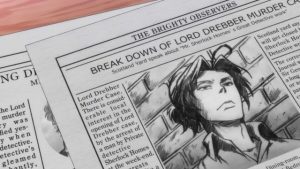 Holmes here, as in Doyle, is a violinist (he owned a Stradivarius in the originals). Here we see him using it as a means to vent a little stress, though without a lot of success. This is strictly an opinion but I think Holmes’ angst over not having taken Jefferson Hope’s deal is a little overplayed. Great pains are taken to show that Sherlock is a man who loves a mystery above all else. Well, he’s got a big one – who is the mastermind, and what is he playing at. So why would Holmes have wanted that spelled out on a silver platter for him – a point which he made himself at the time of Hope’s arrest?
Holmes here, as in Doyle, is a violinist (he owned a Stradivarius in the originals). Here we see him using it as a means to vent a little stress, though without a lot of success. This is strictly an opinion but I think Holmes’ angst over not having taken Jefferson Hope’s deal is a little overplayed. Great pains are taken to show that Sherlock is a man who loves a mystery above all else. Well, he’s got a big one – who is the mastermind, and what is he playing at. So why would Holmes have wanted that spelled out on a silver platter for him – a point which he made himself at the time of Hope’s arrest?
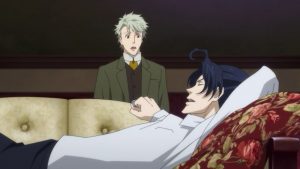 There are other elements of Sherlock’s character which ring truer for me. Like his firing off several rounds on a pistol in order to get Inspector Lestrade to come up to his room. And his general surliness and rudeness, especially towards Watson. That’s an integral part of who Holmes is, and it was ever a source of tension between he and Watson. Holmes is ultimately an eccentric of the highest order, and Doyle was never shy about showing that warts and all. He can be a foil to Moriarty to be sure, but there are certainly times when Sherlock Holmes is not a likeable person.
There are other elements of Sherlock’s character which ring truer for me. Like his firing off several rounds on a pistol in order to get Inspector Lestrade to come up to his room. And his general surliness and rudeness, especially towards Watson. That’s an integral part of who Holmes is, and it was ever a source of tension between he and Watson. Holmes is ultimately an eccentric of the highest order, and Doyle was never shy about showing that warts and all. He can be a foil to Moriarty to be sure, but there are certainly times when Sherlock Holmes is not a likeable person.
 What does Holmes want with Lestrade? Information on any recent deaths by noblemen, as he’s spotted a connection between Debbers’ death and Enders’ demise on the Noahtanic. Lestrade doesn’t seem to know about the Durham incident (a case I suspect Sherlock would have found very interesting) but he does tell Holmes of the seemingly innocuous demise of a viscount in York. Sherlock immediately drags the inspector and Watson to York to investigate, but that turns up nothing of consequence, leaving us for now with the assumption that it really was a death by natural causes.
What does Holmes want with Lestrade? Information on any recent deaths by noblemen, as he’s spotted a connection between Debbers’ death and Enders’ demise on the Noahtanic. Lestrade doesn’t seem to know about the Durham incident (a case I suspect Sherlock would have found very interesting) but he does tell Holmes of the seemingly innocuous demise of a viscount in York. Sherlock immediately drags the inspector and Watson to York to investigate, but that turns up nothing of consequence, leaving us for now with the assumption that it really was a death by natural causes.
 After a rant by Sherlock blaming Watson for his not taking Hope’s deal which I certainly could have done without (see above) things get really interesting. John locks himself in the compartment so Holmes heads for the dining car in a surly mood, only to find the entertaining math professor from the ship and his brother. There are all sorts of interesting questions we could ask here. Did Moriarty know Holmes was on this train, first of all? And if so, did he stage what happens next for his benefit? Or did Holmes stumble on Moriarty in the midst of another of his subversive killings by chance?
After a rant by Sherlock blaming Watson for his not taking Hope’s deal which I certainly could have done without (see above) things get really interesting. John locks himself in the compartment so Holmes heads for the dining car in a surly mood, only to find the entertaining math professor from the ship and his brother. There are all sorts of interesting questions we could ask here. Did Moriarty know Holmes was on this train, first of all? And if so, did he stage what happens next for his benefit? Or did Holmes stumble on Moriarty in the midst of another of his subversive killings by chance?
 A couple of other possibilities seem very unlikely. First, that Holmes knew Moriarty was on that train. And second, that William is unconnected to the bloody death which occurred on it. Louis’ reaction to Holmes suggests he, at least, was surprised by Holmes’ presence so perhaps this meeting is indeed by chance. Then we get to Sherlock’s playful naming of “Liam” (this is the first I’ve heard him called that) as the mastermind behind Hope. Is this a full-on jape as Sherlock says, or does he actually suspect William? He certainly knows Moriarty is intellectually capable of it, even if he doesn’t yet have a suspected motive.
A couple of other possibilities seem very unlikely. First, that Holmes knew Moriarty was on that train. And second, that William is unconnected to the bloody death which occurred on it. Louis’ reaction to Holmes suggests he, at least, was surprised by Holmes’ presence so perhaps this meeting is indeed by chance. Then we get to Sherlock’s playful naming of “Liam” (this is the first I’ve heard him called that) as the mastermind behind Hope. Is this a full-on jape as Sherlock says, or does he actually suspect William? He certainly knows Moriarty is intellectually capable of it, even if he doesn’t yet have a suspected motive.
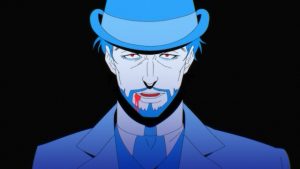 This little dance between the two of them is really the key to everything where Yuukoku no Moriarty is concerned. As different as Holmes and Moriarty historically are, I think the fundamental divide in this version is not good vs. evil, or light vs. dark. It’s that William is deadly serious about everything he does, and Sherlock is a man for whom everything in life is a game. The more the series plays up that angle and stays away from over-the-top moralizing the better it will work dramatically – and of course, the two of them have to be evenly matched. Right now William has the advantage – he knows the central truth Holmes seeks, and Holmes does not. So how will the mastermind leverage that to his advantage here?
This little dance between the two of them is really the key to everything where Yuukoku no Moriarty is concerned. As different as Holmes and Moriarty historically are, I think the fundamental divide in this version is not good vs. evil, or light vs. dark. It’s that William is deadly serious about everything he does, and Sherlock is a man for whom everything in life is a game. The more the series plays up that angle and stays away from over-the-top moralizing the better it will work dramatically – and of course, the two of them have to be evenly matched. Right now William has the advantage – he knows the central truth Holmes seeks, and Holmes does not. So how will the mastermind leverage that to his advantage here?


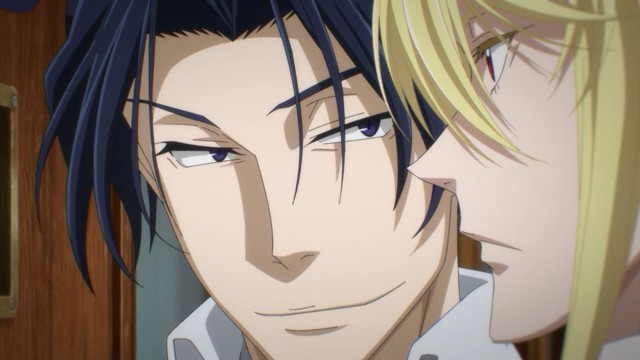



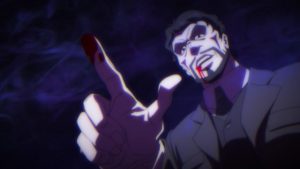


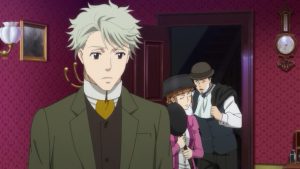


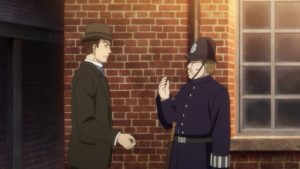




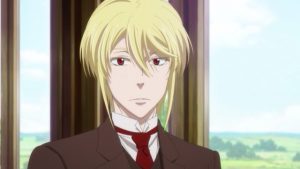



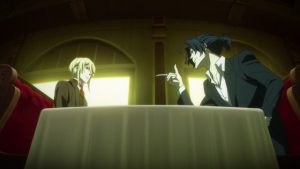

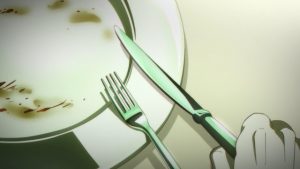








animealex
December 15, 2020 at 3:47 amThe highlight of the episode was (without a doubt) the “Catch me if you can” -scene, but it’s lead-up also intrigues me. Is Holmes completely unaware of the potential danger he might be in, (in other words: a fool) that he doesn’t sense Louis’ murderous intent during his rather intense “gag” accusation of Moriarty?
Also: count me in the crowd of people, who think it was a total coincidence, that the two detectives met on the train.
Guardian Enzo
December 15, 2020 at 7:46 amI agree, total coincidence is the most likely right answer. It’s pretty clear Holmes didn’t know Liam was on it, and Louis at least didn’t seem to know Holmes was.
Your question about the accusation is the more intriguing one. Sherlock is foolish at times but no, I don’t think he’s a fool. I suspect he at least recognizes that Moriarty checks the right boxes to where he could be the mastermind, and is testing his reaction. I’d think less of the way he’s written if that proves not to be the case,